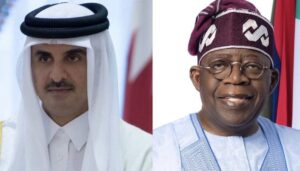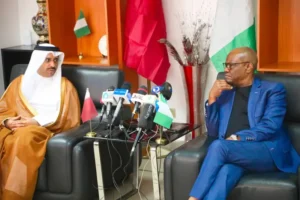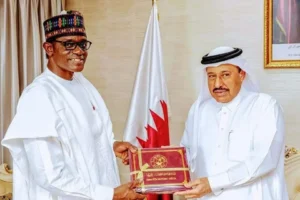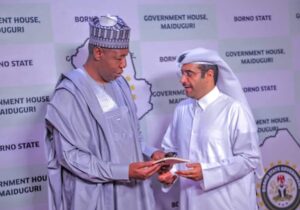By Aminu Jibrin
Indeed, there are more areas to explore in the Nigeria-Qatar ties, the two regional giants: Nigeria, the giant of the black race, and Qatar, the giant of the Arab world. More conversation on partnerships is needed on people to people programmes. For now, the relationship is still on paper. It is not yet uhuru, says experts.
For much of the early 2000s, relations between Nigeria and Qatar drifted quietly, cordial, but thin, limited mostly to formal diplomacy and scattered business interest. Today, that dynamic is changing. Over the past decade, and especially in recent years, the two energy-rich nations have moved toward a more strategic partnership built on trade, investment, agriculture, energy cooperation and cultural exchange. The evolution has been steady but uneven: full of promise, but not without friction.
The establishment of official embassies in Abuja and Doha in 2013 marked a turning point. What followed was a slow but deliberate deepening of engagement, punctuated by high-level visits, business forums and economic missions. When President Bola Ahmed Tinubu met with Qatar’s Emir Sheikh Tamim bin Hamad Al Thani in 2024, the relationship gained the most visible momentum in its history. Multiple bilateral agreements were signed, covering mining, energy cooperation, youth empowerment, investment promotion, and education.
For Nigeria, the objective is clear: diversify the economy beyond oil, bring in foreign capital, attract private-sector expertise, and secure long-term partnerships that boost job creation and food security. For Qatar, a country with financial muscle and growing global commercial ambition, Nigeria represents size, resources and potential, a foothold in West Africa’s largest market.
Trade between both nations remains modest in global terms, but it is rising. Qatari investors have increasingly shown interest in agriculture, petrochemicals, construction financing, logistics and mining — the very sectors Nigeria is trying to modernise. Joint business councils and investment protection agreements currently under negotiation may provide a more reliable framework for long-term capital inflow.
However, these prospects are still more aspiration than achievement. The next phase depends on implementation, whether diplomatic goodwill will translate into factories, farms, processing plants and local industries that employ real people.
The relationship is no longer anchored solely on hydrocarbons. Cultural and tourism exchange have entered the conversation, with public-sector officials on both sides discussing cooperation in heritage preservation, creative industries, hospitality and sports. Qatar, now a major global hub since the 2022 World Cup, sees tourism diplomacy as a soft-power tool. Nigeria, with its youthful creative economy and rich heritage, sees it as a channel to global visibility, artistic export and bilateral goodwill.
If properly cultivated, the Nigeria–Qatar partnership could deliver: Large-scale agricultural investment to support food security, irrigation, livestock production and mechanised farming. Also, industrial value-addition through processing of minerals, agricultural produce, petrochemicals and gas derivatives and job creation for Nigeria’s expanding youth population if projects move beyond memorandum signing into implementation on ground, are all ever before needed.
Other areas include technology and knowledge transfer especially in modern agriculture, smart logistics, gas monetisation and infrastructure financing; increased non-oil exports if Nigeria leverages Qatar’s global freight corridors and financial systems. And while Nigeria brings land, labour, and natural resources; Qatar brings capital, technology and direct investment appetite.
Yet between the promise and the outcome lies a zone of uncertainty.
Several structural issues could slow progress if not addressed: Nigeria’s unpredictable business regulatory environment means that investors fear policy reversals and slow approvals, weak infrastructure, ports, power, rail, cost of doing business and deters long-term commitments.
Security concerns in some agricultural zones affect farms and mining corridors remain difficult to secure.
There exists a slow pace of bilateral agreement implementation. This must be reversed. Moreso, projects risk stalling at MoU stage rather than maturing into execution. There is also a limited awareness among private businesses SMEs in both countries often lack market intelligence or partnership networks. For relations of this scale to mature, both governments must act beyond diplomacy, toward regulation, reform, and ground-level delivery.
Nigeria–Qatar cooperation is no longer symbolic, it is strategic. But strategy is only as powerful as execution. With committed investment, transparent partnership structures and better technical collaboration, this relationship could transform agriculture, diversify exports, stimulate industry and expand employment across sectors.

If both nations move from paper to projects, from promises to outcomes, the Nigeria–Qatar relationship may well become one of the most consequential bilateral economic engagements in Sub-Saharan Africa. The opportunity is present. The world is watching. What remains is implementation, and the political will to carry it through.
Perhaps, the Embassy of Qatar in Abuja must up its communication to Nigerians. This can be done through the local media, socio-cultural and educational programmes. It must assume a new friendly posture, as Nigerians are considered the friendliest people on earth.
From the Embassy
The bilateral relations between the State of Qatar and the Federal Republic of Nigeria are very cordial, as there is a convergence of views on many international and regional issues. Bilateral relations have witnessed a remarkable development during the previous period, especially after the procedures for the presidential elections and President Muhammadu Buhari’s victory in the post of President of the Republic without violence.
The improvement of relations between the two countries was reflected in the visit of His Excellency President Muhammadu Buhari to Doha, based on a kind invitation extended by His Royal Highness Sheikh Tamim bin Hamad Al Thani, the Emir of the State of Qatar (May Allah protect him). A number of agreements were signed during that visit. Also, His Highness, the Amir of the country, visited the Federal Republic of Nigeria on April 23, 2019, in response to the visit of His Excellency President Muhammadu Buhari to Doha









